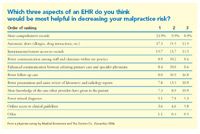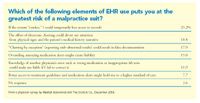Article
Will an EHR affect your malpractice risk?
It could go either way, say doctors and experts. But our survey shows that physicians have different concerns.

Key Points

That's the most important conclusion of a physician survey done recently by Medical Economics and The Doctors Co., a leading malpractice insurer. According to the responses from 548 doctors, improving the ability to defend a malpractice suit ranked far below other reasons for acquiring an EHR, such as more timely access to records, better quality of care, and better documentation. (For complete survey data, see http://www.memag.com/ehrrisk).
To the extent that physicians thought EHRs could help reduce their malpractice exposure, the EHR features they deemed most protective (in order) were more comprehensive records, automatic alerts (allergies, drug interactions, etc.), and instantaneous/remote access to records.
The survey respondents are either Doctors Co. customers or readers of Medical Economics, and 36 percent use EHRs. More than half are primary care physicians; nearly half have been in practice for more than 20 years; 76 percent are male, and 25 percent are from California. While the study's results do not represent all US physicians, the findings reveal some basic attitudes that physicians have about EHRs and liability exposure, according to malpractice attorneys and health IT experts.
Malpractice risk not lower

Few malpractice insurance carriers offer premium discounts if you use an EHR, says David Karp, a risk management consultant in Cloverdale, CA. That's partly because they don't know whether a doctor is using his EHR in a way that will reduce liability risk. "The carriers tend to look at performance. They don't give you a discount for having an EHR if you don't use it right, or if it doesn't improve care or prevent injuries and claims."
While most physicians hope to get discounts, they don't usually view EHRs as lowering their liability risk. One reason, Troxel points out, is that physicians think that malpractice suits arise from misdiagnoses, late diagnoses, or "doing something wrong." The value of EHRs in improving their support system and reducing system errors is not top of mind for most doctors, he says.





